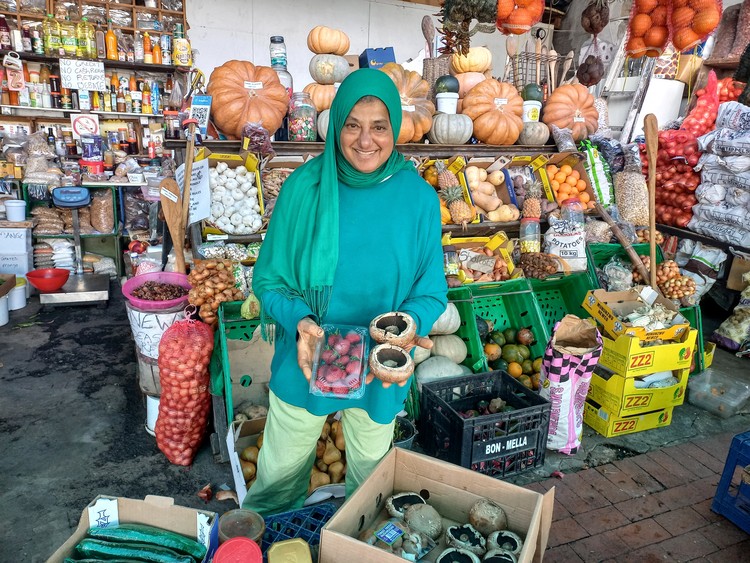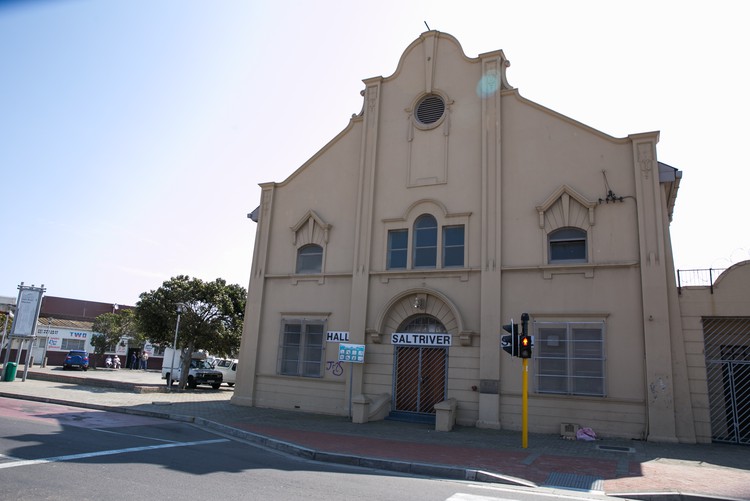Traders at the historic Salt River Market will be excluded from new City development
“This is our livelihood, my bread and butter” says trader
Zubaida Adams says her family have been trading at the Salt River Market for more than 50 years. She and other traders fear they will lose their livelihoods when the market closes to make way for a social housing development. Photo: Marecia Damons
- Traders, some who have been working at the Salt River Market for decades, were shocked when the City of Cape Town announced that the site has been released for construction of a social housing development.
- Many of the traders we spoke to say the closure of the Market will have a devastating impact on their livelihoods and the heritage of the community.
- The City said those with concerns about the development had an opportunity to comment on the development during the City’s public participation process. The City added that it would try to assist the local businesses where possible.
Rumina Adams and her sister Zubaida say their family has been trading at the Salt River Market in Cape Town for more than 50 years. The sisters, like their parents and grandparents, sell an assortment of fresh fruit and vegetables, cooked meals, sweets and nuts among other things.
In July, Mayor Geordin Hill-Lewis announced that the City of Cape Town had tabled the release of land for two major social housing projects which included the development and construction of the Salt River Market precinct. The site is expected to deliver 216 social housing units in a nine-storey mixed-use development.
However, the City has told GroundUp that the informal traders operating at the 17 units will not be included in the new development.
We visited the market this month and spoke to the informal traders who say the closure of the market would have a devastating impact on their livelihoods and the heritage of the community.
“No one from the council told us about the City’s plans. It was just a complete shock to us. We’ve been trading here for so many years. This is our livelihood. If we don’t have this, then where do we go?” asked Adams. She said at least four households survive on the income from her stall and her sister Zubaida’s stall.
Zubaida Adams said although the traders were taken aback, many of them are not opposed to the development, provided that it “brings people back to Salt River”. She said they remain hopeful that the market will be accommodated once the development is completed.
Arthur De Bruyn, who runs a ship chartering business from the market with his wife Bonita, said nearly 100 jobs at the market are at stake.
De Bruyn said prior to Hill-Lewis’ announcement, officials from the Human Settlements department frequently visited the site but were “very tight-lipped” on the City’s plans. “The fact that they are going to start building means that plans have been drawn up already. We just want fair engagement and for them to talk to us,” he said.
Sashen Padayachi runs an automotive business from the market and employs four people. He is the sole breadwinner who supports his wife and two young children. Photo: Marecia Damons
Sashen Padayachi, who runs an automotive business, employs four people. “This is our livelihood, my bread and butter,” he said.
Padayachi said he moved from Pietermaritzburg six years ago to start the business. He is the sole breadwinner, and supports his wife and their children aged 11 and five-months.
“This actually leaves us in a bit of a predicament … Look at all the cost factors involved in moving, and getting all my cars out of here. Who’s going to compensate us for that?” he asked.
Mayoral Committee Member for Human Settlements Malusi Booi said the City had engaged “extensively” with local businesses and the public during a public participation process.
Booi said anyone with concerns had an opportunity to comment on the development during the City’s public participation process. “All comments received during the public participation process were considered and responded to,” said Booi.
But the traders we spoke to said they were never informed about this process to submit their comments.
Although there are no timelines yet for when construction will start at the Salt River Market precinct, Booi said, “The City will look at all available options and will provide assistance to the affected businesses, where possible.”
He said the City has more than 6,500 social housing units in the pipeline near important economic nodes.
The Salt River Market currently houses about 100 traders. The City has just said that the market will not be included in its new housing development plans for the site. Archive photo: Ashraf Hendricks
Support independent journalism
Donate using Payfast

Don't miss out on the latest news
We respect your privacy, and promise we won't spam you.
Next: People queue all night to get their chronic medication
Previous: SAFTU and NUMSA clash as shutdown looms
© 2022 GroundUp. This article is licensed under a Creative Commons Attribution-NoDerivatives 4.0 International License.
You may republish this article, so long as you credit the authors and GroundUp, and do not change the text. Please include a link back to the original article.
We put an invisible pixel in the article so that we can count traffic to republishers. All analytics tools are solely on our servers. We do not give our logs to any third party. Logs are deleted after two weeks. We do not use any IP address identifying information except to count regional traffic. We are solely interested in counting hits, not tracking users. If you republish, please do not delete the invisible pixel.



